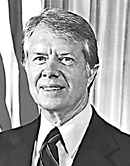
Return to U.S. Presidency - Index Page.
Return to U.S. Presidents' Biographies Page.
Born: 10/1/1924
Birthplace: Plains, Ga.
James Earl Carter, Jr., was born in the tiny village of Plains, Ga., Oct. 1, 1924, and grew up on the family farm at nearby Archery. Both parents were fifth-generation Georgians. His father, James Earl Carter, was known as a segregationist, but treated his black and white workers equally. Carter's mother, Lillian Gordy, was a matriarchal presence in home and community and opposed the then-prevailing code of racial inequality. The future president was baptized in 1935 in the conservative Southern Baptist Church and spoke often of being a “born again” Christian, although committed to the separation of church and state.
Carter married Rosalynn Smith, a neighbor, in 1946. Their first child, John William, was born a year later in Portsmouth, Va. Their other children are James Earl III, born in Honolulu in 1950; Donnel Jeffrey, born in New London, Conn., in 1952; and Amy Lynn, born in Plains in 1967.
In 1946 Carter was graduated from the U.S. Naval Academy at Annapolis and served in the nuclear-submarine program under Adm. Hyman G. Rickover. In 1954, after his father's death, he resigned from the Navy to take over the family's flourishing warehouse and cotton gin, with several thousand acres for growing seed peanuts.
Carter was elected to the Georgia Senate in 1962. In 1966 he lost the race for Governor, but was elected in 1970. His term brought a state government reorganization, sharply reduced agencies, increased economy and efficiency, and new social programs, all with no general tax increase. In 1972 the peanut farmer–politician set his sights on the presidency and in 1974 built a base for himself as he criss-crossed the country as chairman of the Democratic Campaign Committee, appealing for revival and reform. In 1975 his image as a typical Southern white was erased when he won support of most of the old Southern civil-rights coalition after endorsement by Rep. Andrew Young, black Democrat from Atlanta, who had been the closest aide to the Rev. Martin Luther King, Jr. At Carter's 1971 inauguration as Governor he had called for an end to all forms of racial discrimination.
In the 1976 spring primaries, he won 19 out of 31 with a broad appeal to conservatives and liberals, black and white, poor and well-to-do. Throughout his campaigning Carter set forth his policies in his soft Southern voice, and with his electric-blue stare faced down skeptics who joked about “Jimmy Who?” His toothy smile became his trademark. He was nominated on the first roll-call vote of the 1976 Bicentennial Democratic National Convention in New York, and defeated Gerald R. Ford in November. Likewise, in 1980 he was renominated on the first ballot after vanquishing Senator Edward M. Kennedy of Massachusetts in the primaries. At the convention he defeated the Kennedy forces in their attempt to block a party rule that bound a large majority of pledged delegates to vote for Carter. In the election campaign, Carter attacked his rivals, Ronald Reagan and John B. Anderson, independent, with the warning that a Reagan Republican victory would heighten the risk of war and impede civil rights and economic opportunity. In November Carter lost to Reagan, who won 489 Electoral College votes and 51% of the popular tally, to 49 electoral votes and 41% for Carter.
In his one term, Carter fought hard for his programs against resistance from an independent-minded Democratic Congress that frustrated many pet projects although it overrode only two vetoes. Many of his difficulties were traced to his aides' brusqueness in dealing with Capitol Hill and insensitivity to Congressional feelings and tradition. Observers generally viewed public dissatisfaction with the “stagflation” economy as a principal factor in his defeat. Others included his jittery performance in the debate Oct. 28 with Reagan, staff problems, friction with Congress, long gasoline lines, and the months-long Iranian crisis, including the abortive sally in April 1980 to free the hostages. Yet, assessments of his record noted many positive elements. There was, for one thing, peace throughout his term, with no American combat deaths and with a brake on the advocates of force. Regarded as perhaps his greatest personal achievements were the Camp David accords between Israel and Egypt and the resulting treaty—the first between Israel and an Arab neighbor. The treaty with China and the Panama Canal treaties were also major achievements. Carter worked for nuclear-arms control. His concern for international human rights was credited with saving lives and reducing torture, and he supported the British policy that ended internecine warfare in Rhodesia, now Zimbabwe. Domestically, his environmental record was a major accomplishment. His judicial appointments won acclaim; the Southerner who had forsworn racism made 265 choices for the Federal bench that included minority members and women. He also ended the U.S. practice of holding petroleum prices far below world levels with price decontrols.





